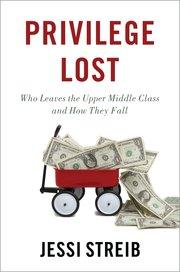
We have two narratives about class in this country. Perhaps the most prominent is the American Dream – the idea that hard work and moral fortitude can lead people from rages to riches. The second is that of the rigged class system, one designed to ensure that the privileged remain privileged while the poor remain poor.
There are several problems with these narratives, but I want to focus on one: they both miss a large group of people, the downwardly mobile. In fact, one in two kids born into the upper-middle-class – one in two kids born to a college-educated professional parent – fall out of this class as adults.
I wanted to learn how kids raised with so much could lose the privileges they had. So I poured over interviews researchers conducted with over 100 upper-middle-class Americans who they followed from age 13 to age 28. I found out that my idea that they have so many resources was wrong.
As I write in my new book, Privilege Lost: Who Leaves the Upper Middle Class and How They Fall, being born into the upper middle class doesn’t guarantee that children receive high levels of the three resources that help them stay at the top: academic skills, institutional knowledge, and money. These resources depend on parents having them and passing them down, and that doesn’t happen as often as the rigged class system narrative leads us to believe.
Some upper-middle-class parents do not have high levels of these resources themselves. Not all professionals earn a lot of money, so they don’t have it to pass down. In many families, the parent most involved in childrearing – usually the mother – does not have a college degree or a professional job, so she isn’t well positioned to teach her children how to navigate college or prepare for the professional workforce. Of course, some parents who do have all of the resources of the upper middle class don’t pass them on to their children. They may work so much that they spend little time with their children, become too sick to pass them down, or just believe that children should forge their own path. And sometimes, health issues keep kids from internalizing or using the resources they get from their parents.
Children who receive few resources from their parents realize that they this will limit their ability to gain status through school and work. Many then decide that these resources are not worth having and that they don’t want to spend their time in the institutions that value those resources. Instead, they form identities based on what their resources allow: as a wife and mother, family man, artist, athlete, rebel, or the like. This gives them ways to gain status, but it also leads to a change in their class. Instead of focusing on school, college, and professional jobs, they opt out of these institutions – putting themselves on a downwardly mobile path.
Virginia is a good example. Her father was an upper-level executive who earned a six-figure income, so she grew up in a six-bedroom house. But Virginia’s dad was so busy working that she barely knew him. They didn’t talk much about school and his work. Instead, Virginia spent most of her time with her mother, who had dropped out of college when she became pregnant with Virginia’s older sister and had been a stay-at-home mother ever since. She didn’t know how to navigate college and professional jobs herself.
Raised without the knowledge that helps students succeed in school or work, Virginia was unlikely to excel in either. So, she opted out. She saw school as a place to pass through, deemed college irrelevant, and framed professional work as immoral as it would take time away from the people she cared about most. Instead of drawing on her community to gain the resources she would have needed to succeed in school, college, and work, she set her sights on fulfilling roles her resources allowed: becoming a wife and mother.
Read the rest of this piece at Working Class Perspectives.
Jessi Streib is an Assistant Professor of Sociology at Duke University and the author of Privilege Lost: Who Leaves the Upper Middle Class and How They Fall.












